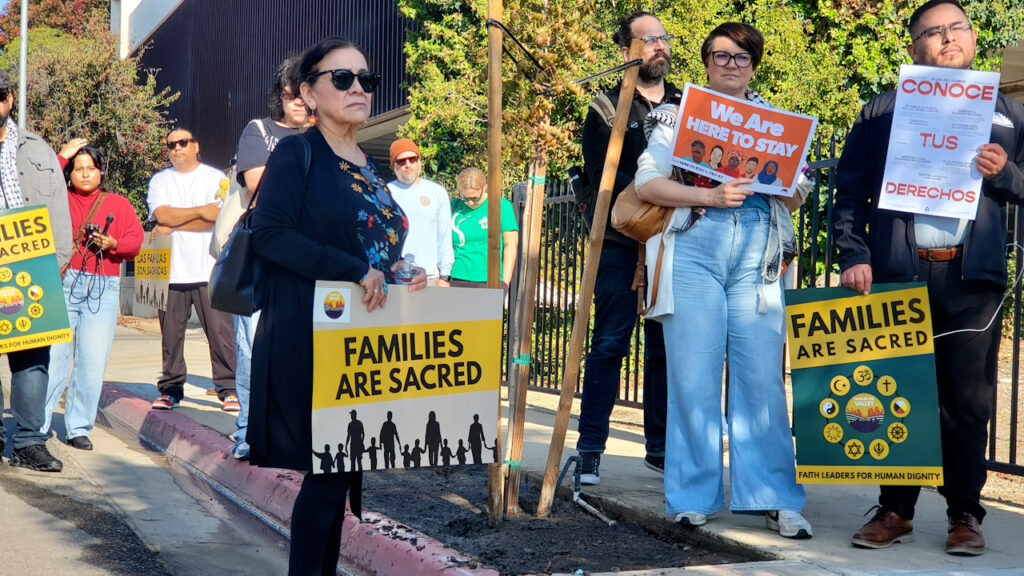House Speaker Mike Johnson (R-La.) speaks at a news conference with House Republican leadership after a House Republican caucus meeting on Capitol Hill in Washington, on Wednesday, June 4, 2025. Johnson, at his weekly news conference at the Capitol, said he had spoken with President Trump about Elon Musk’s continuing attacks on the major domestic policy bill Republicans are trying to pass. (Haiyun Jiang/The New York Times)

- Republican bill would leave 4 million people uninsured through technical changes and paperwork requirements.
- Additional 4.2 million Americans could lose coverage if extra Obamacare funding expires this year.
- Younger, healthier enrollees most likely to drop coverage, potentially destabilizing insurance markets.
Share
Millions of Affordable Care Act enrollees would lose health coverage under the Republicans’ major policy bill, which would make coverage more expensive and harder to obtain.
Most of the proposals in the bill, which passed the House last month, are technical changes — reductions to enrollment periods, adjustments to formulas, and additional paperwork requirements. But together, they would leave about 4 million people uninsured in the next 10 years, the Congressional Budget Office reported Wednesday.
“In many ways, it’s sort of repeal by paper cut,” said Audrey Morse Gasteier, the director of the state marketplace in Massachusetts.
Alongside these proposals is another challenge to the program: Additional “Obamacare” funding is set to expire at the end of the year, and Republicans do not plan to extend it. If they don’t, the CBO estimates an additional 4.2 million Americans would lose coverage.
Taken together, proposed changes and the expiration of the subsidies could threaten the viability of the “Obamacare” markets themselves, which have more than tripled in size since 2014, and currently cover 24 million people.
“This bill poses a seriously existential threat to the future of the Affordable Care Act marketplaces in a way that we haven’t seen since 2017,” said Sabrina Corlette, co-director of the Center on Health Insurance Reforms at Georgetown University.
Medicaid Cuts Would Compound Coverage Losses
These losses would be in addition to those from the bill’s many changes to Medicaid, the health insurance program for the poor and disabled. Cuts to Medicaid are expected to cause 7.8 million more people to be uninsured by the end of a decade.
The White House is broadly supportive of the changes, said Kush Desai, a spokesperson, who contended the bill would lower premiums for certain enrollees and reduce fraud in the “Obamacare” marketplaces.
It is unclear whether the Senate, which returned from recess this week, will make any major changes to the “Obamacare” provisions of the policy bill or extend the extra tax credit funding.
More Paperwork, Less Generous Benefits
The bill’s changes to the marketplaces can be thought of in three large categories.
By imposing additional paperwork requirements, the bill would make it harder to sign up for insurance and qualify for tax credits. The Republican bill would unwind much of the automation built into “Obamacare” by design. The current system allows most people to sign up for coverage and financial assistance in one online session by allowing systems to automatically ping electronic databases to confirm key details, like income and citizenship.
Instead, the bill would require more people to present original documents at the time they enroll for coverage, and require marketplace workers to manually check them. People who can’t easily prove their income is correct would not receive subsidies, with no grace period.
Critics of the changes say the new paperwork requirements and the tight time frame for completing them — the bill would also halve the annual enrollment window, from 90 days to 45 — mean many people would lose coverage simply because they didn’t gather and verify documents in time.
Second, the bill would make “Obamacare” more expensive for many patients. A proposed tweak to a federal formula would allow insurers to cover a smaller share of medical costs. Another proposal would slightly increase the share of people’s incomes they could be asked to pay for health insurance. A third would require enrollees to pay the government back any extra tax credits they received because they incorrectly estimated their income (under current law, these so-called “reconciliation” payments are capped for low-income enrollees).
Third, the bill would block many legal immigrants, including refugees and those on student visas, from using government subsidies. The “Obamacare” marketplaces have always prohibited immigrants in the country illegally from accessing tax credits, but this additional exception will cause around 1 million immigrants to become uninsured. Gasteier estimates that this group makes up about 55,000 of Massachusetts’ 400,000 enrollees.
“We expect they would not be able to afford the coverage that they’re in today and would drop coverage and become uninsured,” she said.
Market Stability at Risk
House Republicans and conservative health policy experts who have advised them on the legislation say the changes in the bill are meant to ensure only eligible people get federal help. They have made similar arguments about new reporting requirements the bill establishes for the Medicaid program.
Brian Blase, the president of the Paragon Institute, a conservative health research group, has published papers arguing fraud is widespread in the marketplaces. He said the new checks would ensure that people who receive federal tax credits actually qualify for the help.
“Should people have to do something when the taxpayer is bearing most of the cost? Yes, that’s a no-brainer,” he said. “They are making a claim of government benefits. It’s not too much to ask that they spend 15 to 30 minutes updating their information.”
In general, the kind of people most likely to slip through the cracks are younger, healthier people, who may decide health insurance is not worth the trouble, Corlette said.
“People who are high-risk, high-need are going to crawl through broken glass,” she said. “It’s the healthy, young folks who are going to say: ‘Oh man, forget it. I’m going to go uninsured.'”
The loss of younger, healthier enrollees could unsettle entire marketplaces, potentially driving up the cost of insurance and discouraging some insurers from participating. Early in Trump’s first term, the markets were so small that many places offered few insurance choices. And some rural counties came close to having no insurers offering “Obamacare” coverage at all. In recent years, as extra subsidies and more flexible enrollment rules have helped increase enrollment, the markets have become more costly for taxpayers, but also much more robust.
“The market will become a smaller, less healthy, more expensive place,” said Katherine Hempstead, a senior policy officer at the Robert Wood Johnson Foundation. Her research suggests that the biggest effects are likely to be felt in rural areas, where enrollment is more sparse and there is little competition among hospitals to help moderate prices.
—
This article originally appeared in The New York Times.
By Sarah Kliff and Margot Sanger-Katz/Haiyun Jiang
c. 2025 The New York Times Company
RELATED TOPICS:
Categories

Fresno Launching Neighborhood Repaving Project Monday



















